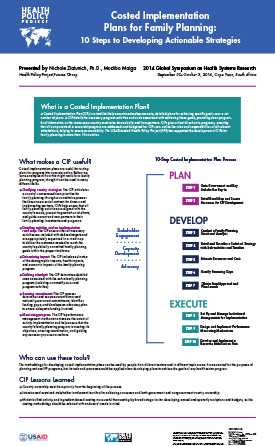The Health Policy Project ended in 2016. Work continued under Health Policy Plus (HP+) until 2022.
PUBLICATION

Author(s): Nichole Zlatunich and Modibo Maiga
Primary Language: English
Date: 9/30/2014
Abstract:
Costed Implementation Plans (CIPs) for family planning are concrete, detailed plans for achieving the goals of a national family planning program over a set number of years. A CIP details the program activities necessary to meet stated goals and the costs associated with those activities, thereby providing clear program-level information on the resources a country must raise both domestically and from donors to achieve their goals. The CIP addresses and budgets for all components of a family planning program—demand, service delivery and access, procurement and supply chain, policy and enabling environment, financing, supervision, and monitoring and evaluation. The USAID-funded Health Policy Project’s 10-step approach creates a CIP aligned with ongoing government planning and coordination efforts. By including processes to ensure inclusion of often-marginalized populations and civil society groups, this approach ensures that the national CIP is collaborative, country-owned, and country-driven from inception. The 10-step approach also utilizes custom tools to develop detailed cost estimates, to identify financing gaps, and to estimate the demographic, health, and economic impacts of successful CIP implementation (e.g., number of women’s and children’s lives saved, healthcare costs saved, etc.). The CIP process culminates in a consensus-driven strategy, as well as a detailed activity roadmap and budget to make the strategy actionable. The 10-step approach results in strategies that promote people-centered health systems that improve healthcare outcomes through respecting rights, addressing social exclusion and inequities (with a focus on gender, adolescents, and people living in rural and underserved areas). This presentation is relevant to a wide cross-section of the Symposium’s diverse target audiences, particularly policy-makers, managers, and civil society participants, who would benefit from learning about the experiences of various countries in developing costed health strategies that are participatory and inclusive.
Costed Implementation Plan Family Planning/Reproductive Health (FP/RH) FP2020/30 Non-Government/Community Service Org. (NGO/CSO) Parliamentarians Policy Poster Global

